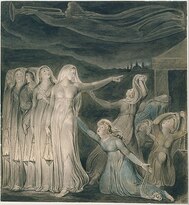
1. Where’s the bride – and why does she let her husband-to-be refuse entry to half her friends?
2. Why does this bunch of twelve year olds (about the average age for a ‘virgin’ or young girl in Biblical times) put up with waiting long into the night, until they are so tired they fall asleep?
3. If being prepared is a virtue, why is punctuality not also required?
4. Why do they not have a communal supply of oil, preferably supplied by the bride and groom, as it is after all their wedding – what is this with individual containers?
5. Why do the so-called ‘wise’ ones refuse to share?
6. Do the ‘so-called’ foolish ones actually manage to replenish their oil stock? – it says they come back, but it never indicates that they found more oil.
7. Is this a situation where sharing actually won’t help because the overall resource is too small to do the job?
8. Why is this story so anxiety provoking? (It really should have a mental health warning I think)
9. Is that because it taps into all our primal fears about being excluded and locked out?
10. What did the five excluded young women do afterwards?
- they were my 10 questions and I am sure you will have others. Overarching them all, is a key question we might want to ask of any Biblical text – What is the ‘good news’ here – what in this text is life-giving and could be considered to have authority in the sense of authoring life?
Now I could take you down the by-ways of wedding customs in the Jewish world. I could have you delve into the use of wedding imagery and especially wedding feast imagery in Biblical literature. I could have you consider Christian mystical ideas of the marriage of Christ the groom to their bride the Church. I could certainly have you ponder the idea that spiritual capital is individual and not communal – I cannot share my spiritual peace with you for example; you must put the effort in and receive your own share. Or I could tell you that this is all about Matthew’s church being frustrated at the slowness of Jesus’s second coming and needing to persuade people to hang in and be ready.
However, I am not convinced that any of that will help us much with this parable. What might help us is to recognise that Jesus delivered his teaching always in a communal setting, and one where he would have expected heckling and objections and that those listening would have been up for a tussle about the meaning of whatever he presented. So that’s what we are doing today, we are wrestling with this story, and seeing if we can find any goodness in it. And I do want to think more about what those five ‘foolish’ virgins did next. To do that we have to stop treating the story as an allegory, capable of only one interpretation, and start treating it as a parable. Then we can untie the knot that says that the bridegroom is Christ, the wedding feast is heaven and only the wise and ready ones get in, so be wise and ready; and consider some other possibilities.
What if in fact these rather pharisaic and judgmental ‘wise’ ones are to be left – like the scribes and Pharisees – to enjoy their feast behind the safely locked door of the law, and their more playful counterparts be freed for something new? For the word foolish is capable of a different interpretation – indeed it relates to our English word ‘silly’, which has its origins in the Old English ‘seilig’, meaning holy. To be foolish is not necessarily to be far from God. So maybe these foolish and playful ones might be closer to Jesus than their oh so prepared counterparts?
What do you think? I know that if I was in a small group locked out from a party and rejected by a host who hadn’t even bothered to turn up on time, when I was awake and had my light burning brightly for them, I don’t think I’d be worrying too much about what I was missing. I think I just might be turning to my companions and saying – ‘how about we go somewhere else? I know a really good little place up the street…..’ And from what we know of Jesus in other places, I don’t think He would be averse to a rather more unstructured party, with some less than respectable guests.
So I leave you with the thought that rather than having an anxiety attack about ever being ready enough for Jesus’s return, we might do better to engage in a little foolishness and therein catch some joy – the inalienable sign of the Spirit. Amen.
by Penny Jones, for Sunday 8 November 2020
image: Metropolitan Musuem of Art, via wikipedia commons
 RSS Feed
RSS Feed